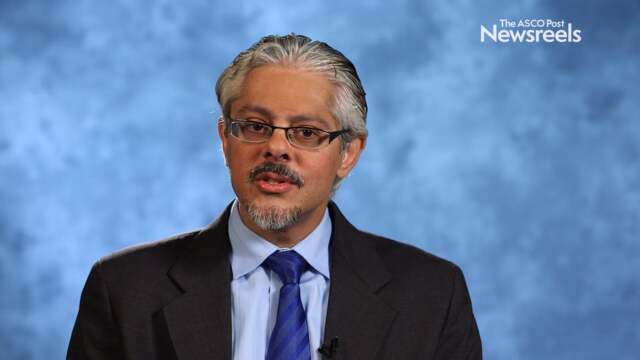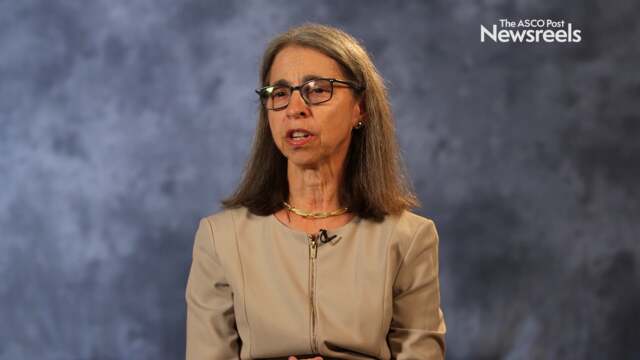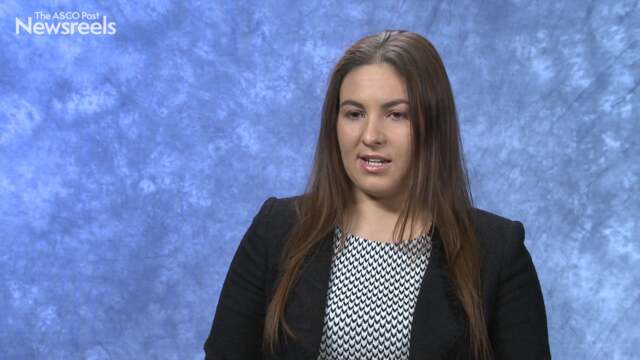Outcomes After Discontinuation of Tyrosine Kinase Inhibitor Therapy in Chronic Myeloid Leukemia
In an interim analysis of a European trial reported in The Lancet Oncology, Saussele et al found that discontinuation of tyrosine kinase inhibitor therapy in patients with chronic myeloid leukemia (CML) with deep molecular response was associated with good molecular relapse-free survival,...
Clearance of Somatic Mutations at Remission and Outcomes in AML
In a study reported in the Journal of Clinical Oncology, Morita et al found that clearance of somatic mutations at complete remission—particularly those in nonpreleukemic genes—was associated with improved outcomes in previously untreated patients with acute myeloid leukemia (AML)....
Minimal Residual Disease in Acute Myeloid Leukemia: Mutation Matters
A RECENT article in The New England Journal of Medicine explored the nuances of minimal/measurable residual disease testing after induction treatment of acute myeloid leukemia (AML)1 and David P. Steensma, MD, and Benjamin L. Ebert, MD, PhD, of Dana-Farber Cancer Institute and Harvard Medical...
Results From the Full Population of a Phase II Trial of Venetoclax in CLL With 17p Deletion
In an article published in the Journal of Clinical Oncology, Stilgenbauer et al reported findings from the full population of the phase II trial that supported the 2016 approval of venetoclax (Venclexta) in the treatment of previously treated chronic lymphocytic leukemia (CLL) with 17p deletion....
Nilotinib Label Updated to Provide Treatment Discontinuation Recommendations for CML With Sustained Molecular Response
On December 22, 2017, the product label for nilotinib (Tasigna) was updated to include information on nilotinib discontinuation, postdiscontinuation monitoring, and guidance for treatment reinitiation in patients with Philadelphia chromosome (Ph)-positive chronic myeloid leukemia (CML) who have...
Pediatric Centers May Improve Survival for Adolescents and Young Adults With ALL
Adolescents and young adults (AYAs) with acute lymphocytic leukemia (ALL) have a survival advantage if they receive treatment at a pediatric cancer center vs an adult center, according to a study published by Muffly et al in Blood Advances. The findings also suggest that treatment at a center...
Fine-Tuning Treatment in Myeloma and Leukemia
It is a difficult task to include every notable presentation from the 2017 American Society of Hematology (ASH) Annual Meeting & Exposition. In addition to our more comprehensive coverage of the news from that meeting over the past several issues, below are summaries of additional key...
Minimal Residual Disease and Risk Stratification in Acute Myeloid Leukemia
In an analysis of the UK National Cancer Research Institute AML17 trial reported in the Journal of Clinical Oncology, Freeman et al found that detection of measureable/minimal residual disease (MRD) after first induction in acute myeloid leukemia (AML) may be prognostically equivalent to partial...
FDA Accepts New Drug Application, Grants Priority Review for Duvelisib in CLL/SLL and Follicular Lymphoma
On April 9, the U.S. Food and Drug Administration (FDA) accepted for filing with Priority Review a new drug application (NDA) for the oral agent duvelisib, a first-in-class, dual inhibitor of phosphoinositide 3-kinase (PI3K)-delta and PI3K-gamma. The NDA is seeking full approval for duvelisib in...
Targeted Sequencing Detection of Molecular Minimal Residual Disease and Prognosis in AML
In a study reported in The New England Journal of Medicine, Jongen-Lavrencic et al found that molecular minimal residual disease identified by next-generation sequencing during complete remission was associated with increased risk of relapse and mortality over 4 years of follow-up in patients with...
FDA Accepts BLA for Moxetumomab Pasudotox in Hairy Cell Leukemia
On April 3, the U.S. Food and Drug Administration (FDA) accepted a Biologics License Application (BLA) for moxetumomab pasudotox, an investigational anti-CD22 recombinant immunotoxin and a potential new medicine for the treatment of adult patients with hairy cell leukemia (HCL) who have received at ...
Venetoclax in Chronic Lymphocytic Leukemia Progressing After Ibrutinib
An interim analysis of a phase II trial reported by Jones et al in The Lancet Oncology indicates that venetoclax (Venclexta) produces a response in a high proportion of patients with chronic lymphocytic leukemia (CLL) progressing on or after ibrutinib (Imbruvica) treatment. John C. Byrd, MD, of...
FDA Expands Nilotinib Indication to Pediatric Patients With CML
On March 22, the U.S. Food and Drug Administration (FDA) expanded the indication for nilotinib (Tasigna) to include treatment of first- and second-line pediatric patients 1 year of age or older with Philadelphia chromosome–positive chronic myeloid leukemia (CML) in the chronic phase. In the United ...
Venetoclax Plus Rituximab in Relapsed/Refractory Chronic Lymphocytic Leukemia
In the phase III MURANO trial reported in The New England Journal of Medicine by Seymour et al, the combination of the BCL2 inhibitor venetoclax (Venclexta) with rituximab (Rituxan) markedly improved progression-free survival vs bendamustine plus rituximab in patients with relapsed or refractory...
FDA Expands Approval of Blinatumomab for Certain Patients With B-Cell Precursor ALL
The U.S. Food and Drug Administration granted accelerated approval to blinatumomab (Blincyto) to treat adults and children with B-cell precursor acute lymphoblastic leukemia (ALL) who are in remission but still have minimal residual disease (MRD). In patients who have achieved remission after...
IKZF1 Deletion–Based Gene Profile and Outcome in Pediatric B-Cell Precursor ALL
In a study reported in the Journal of Clinical Oncology, Stanulla et al found that a gene profile including somatic deletions in the lymphoid transcription factor–coding gene IKZF1 and deletions in other genes was associated with minimal residual disease (MRD)-dependent very-poor prognosis...
Bijal D. Shah, MD, on What ALL Tells Us About CAR T Cells
Bijal D. Shah, MD, of the H. Lee Moffitt Cancer Center, discusses key studies of CAR T-cell therapy in relapsed B-cell ALL and the adverse events that this treatment may cause.
Venetoclax in Chronic Lymphocytic Leukemia Progressing After Ibrutinib
An interim analysis of a phase II trial reported by Jones et al in The Lancet Oncology indicates that venetoclax (Venclexta) produces a response in a high proportion of patients with chronic lymphocytic leukemia (CLL) progressing on or after ibrutinib (Imbruvica) treatment. John C. Byrd, MD, of The ...
FDA Expands Nilotinib Indication to Pediatric Patients With CML
Today, the U.S. Food and Drug Administration (FDA) expanded the indication for nilotinib (Tasigna) to include treatment of first- and second-line pediatric patients 1 year of age or older with Philadelphia chromosome–positive chronic myeloid leukemia in the chronic phase. In the United...
Ellin Berman, MD, on CML: Disease Management During Pregnancy
Ellin Berman, MD, of Memorial Sloan Kettering Cancer Center, discusses the effects of TKI therapy on fetal development, its impact on pregnancy outcomes, and how to develop an effective treatment plan.
Martin S. Tallman, MD, Joins Samuel Waxman Cancer Research Foundation’s Scientific Advisory Board
The Samuel Waxman Cancer Research Foundation (SWCRF) announced that Martin S. Tallman, MD, Chief of Leukemia Service at Memorial Sloan Kettering Cancer Center (MSK), has joined its Scientific Advisory Board. Dr. Tallman, who will continue in his role at MSK, will join his fellow Scientific...
Trivalent CAR T-Cell Design May Enhance Antitumor Efficacy in Acute Lymphoblastic Leukemia
A novel approach to chimeric antigen receptor (CAR) T-cell therapy seems to effectively target acute lymphoblastic leukemia (ALL) cells with varying antigen profiles and may help to overcome antigen escape, seen with CD19-targeted therapy. According to data presented at the 2018 ASCO-SITC Clinical...
Prognostic Factors for Complete Response to Ibrutinib in Chronic Lymphocytic Leukemia
In an analysis of two pooled studies reported in JAMA Oncology, O’Brien et al found that a complete response to ibrutinib (Imbruvica) in the treatment of chronic lymphocytic leukemia was more likely in patients receiving the agent as first-line therapy and in those without bulky disease....
Patients With AML Have Reduced Risk of Early Mortality at NCI-Designated Cancer Centers
Researchers at the University of California (UC), Davis, have shown that patients with acute myeloid leukemia (AML) who received their care at a National Cancer Institute (NCI) cancer center in California had a dramatically reduced risk of early mortality. Using data from the California Cancer...
A River Runs Through the Life of a Leukemia Specialist
GUEST EDITOR Dr. Abraham is the Director of the Breast Oncology Program at Taussig Cancer Institute, and Professor of Medicine, Lerner College of Medicine, Cleveland Clinic. MATT KALAYCIO, MD Affiliation: Cleveland Clinic Taussig Cancer InstituteOn balancing priorities: “As an oncologist in...
FDA Accepts NDA, Grants Priority Review for Ivosidenib in Relapsed or Refractory IDH1-Mutated AML
On February 15, the U.S. Food and Drug Administration (FDA) accepted a new drug application (NDA) for ivosidenib (AG-120) for the treatment of patients with relapsed or refractory acute myeloid leukemia (AML) with an isocitrate dehydrogenase 1 (IDH1) mutation. The NDA was granted Priority Review...
Dasatinib for Pediatric Chronic Myeloid Leukemia in Chronic Phase
As reported in the Journal of Clinical Oncology by Gore et al, a phase II trial has shown high response rates with dasatinib treatment in pediatric patients with Philadelphia chromosome–positive (Ph+) chronic myeloid leukemia in chronic phase (CML-CP). Findings in the trial supported the...
Bosutinib in Newly Diagnosed Chronic-Phase Philadelphia Chromosome–Positive Chronic Myeloid Leukemia
In the Clinic provides overviews of novel oncology agents, addressing indications, mechanisms of action, administration recommendations, safety profiles, and other essential information needed for the appropriate clinical use of these drugs. On December 19, 2017, bosutinib (Bosulif) was granted...
FDA Accepts BLA for Calaspargase Pegol in Acute Lymphoblastic Leukemia
On February 28, Shire announced that the U.S. Food and Drug Administration (FDA) accepted the company’s biologics license application (BLA) for calaspargase pegol (Cal-PEG; SHP663). The investigational-stage compound is being reviewed as a component of a multiagent chemotherapeutic regimen...
Data Favoring Maintenance Therapy in Older Patients With AML Accumulate
The use of maintenance therapy in older patients with acute myeloid leukemia (AML) is theoretically sensible, but its clinical value remains uncertain. The phase III HOVON97 randomized study demonstrated that maintenance therapy with the hypomethylating agent azacitidine may improve disease-free...
Guadecitabine in Treatment-Naive Older Patients With Acute Myeloid Leukemia
The results of a phase II trial have shown high activity of guadecitabine, a next-generation hypomethylating drug, in treatment-naive older patients with acute myeloid leukemia. The findings were reported in The Lancet Oncology by Hagop M. Kantarjian, MD, of The University of Texas MD Anderson...
FDA Accepts NDA, Grants Priority Review for Ivosidenib in Relapsed or Refractory IDH1-Mutated AML
On February 15, the U.S. Food and Drug Administration (FDA) accepted a new drug application (NDA) for ivosidenib (AG-120) for the treatment of patients with relapsed or refractory acute myeloid leukemia (AML) with an isocitrate dehydrogenase 1 (IDH1) mutation. The NDA was granted Priority Review...
FDA’s Oncologic Drugs Advisory Committee to Review Potential New Use of Blinatumomab
On February 14, Amgen announced that the Oncologic Drugs Advisory Committee of the U.S. Food and Drug Administration (FDA) will review data supporting the supplemental biologics license application (sBLA) for blinatumomab (Blincyto) for the treatment of patients with minimal residual disease...
Enasidenib in IDH2-Mutant Relapsed or Refractory Acute Myeloid Leukemia
On August 1, 2017, the IDH2 inhibitor enasidenib (Idhifa) was granted regular approval for treatment of adult patients with relapsed or refractory acute myeloid leukemia (AML) with an isocitrate dehydrogenase-2 (IDH2) mutation as detected by a U.S. Food and Drug Administration (FDA)-approved...
Blinatumomab in Relapsed or Refractory B-Cell Precursor ALL
On July 11, 2017, blinatumomab (Blincyto) was approved for the treatment of relapsed or refractory B-cell precursor acute lymphoblastic leukemia (ALL) in adults and children.1,2 Blinatumomab received accelerated approval in December 2014 for the treatment of Philadelphia chromosome (Ph)-negative...
Updated Analysis of ELIANA Trial Shows Longer-Term Durable Remissions With Tisagenlecleucel in Children, Young Adults With Relapsed/Refractory ALL
Updated results from the ELIANA clinical trial of tisagenlecleucel (Kymriah), formerly CTL019, in relapsed or refractory pediatric and young adult patients with B-cell acute lymphoblastic leukemia (ALL) have been published by Maude et al in The New England Journal of Medicine. New data include...
Addition of Antibody-Drug Conjugate to Low-Intensity Chemotherapy in Older Patients With ALL
In a single-center phase II study reported in The Lancet Oncology, Kantarjian et al found that the addition of inotuzumab ozogamicin (Besponsa) to low-intensity chemotherapy produced promising outcomes in older patients with newly diagnosed Philadelphia chromosome–negative acute lymphoblastic ...
Kristen Fousek, PhD Candidate, on B-Cell ALL: CAR T-Cell Treatment
Kristen Fousek, PhD Candidate at Baylor College of Medicine, discusses her preclinical work on targeting CD19-negative relapsed B-cell acute lymphoblastic leukemia, using CAR T cells that target three antigens simultaneously, a technique that addresses the growing problem of relapse (Abstract 121).
Against All Odds
The days leading up to our daughter Emily’s diagnosis of acute lymphoblastic leukemia (ALL) on May 28, 2010, when she was just 5, offered few clues about the terrifying, life-and-death months and years we were about to experience. She was happy and seemingly healthy, literally until the day before...
FDA Approves Arsenic Trioxide With Tretinoin for First-Line Treatment of Acute Promyelocytic Leukemia
ON JANUARY 15, 2018, the U.S. Food and Drug Administration (FDA) approved the use of arsenic trioxide (Trisenox) injection in combination with tretinoin for the treatment of adults with newly diagnosed low-risk acute promyelocytic leukemia whose disease is characterized by the presence of the...
Venetoclax Plus Rituximab Outperforms Standard Bendamustine Plus Rituximab in CLL
Venetoclax (Venclexta) plus rituximab (Rituxan)—a non–chemotherapy-containing regimen—was superior to standard-of-care bendamustine plus rituximab for patients with relapsed or refractory chronic lymphocytic leukemia (CLL), according to a final analysis of the phase III MURANO study reported at...
Effect of TP53 Germline Variations on Outcomes in Pediatric B-Cell ALL
In a study reported in the Journal of Clinical Oncology, Qian et al found that loss-of-function germline TP53 variants increase the risk of childhood B-cell acute lymphoblastic leukemia (ALL), as well as the risk of poorer response to therapy and second malignancies. Study Details In the study,...
Arsenic Trioxide With Tretinoin for First-Line Treatment of Acute Promyelocytic Leukemia Approved by the FDA
On January 15, the U.S. Food and Drug Administration (FDA) approved the use of arsenic trioxide (Trisenox) injection in combination with tretinoin for the treatment of adults with newly-diagnosed low-risk acute promyelocytic leukemia (APL) whose APL is characterized by the presence of the t(15;17)...
Radioiodine Treatment of Well-Differentiated Thyroid Cancer and Hematologic Malignancy Risk
In a study reported in the Journal of Clinical Oncology, Molenaar et al found that radioiodine treatment for well-differentiated thyroid cancer was associated with an increased risk of acute myeloid leukemia (AML) and chronic myeloid leukemia (CML) compared with thyroidectomy alone. Study Details ...
Venetoclax in Chronic Lymphocytic Leukemia Progressing After Ibrutinib
An interim analysis of a phase II trial reported by Jones et al in The Lancet Oncology indicates that venetoclax (Venclexta) produces a response in a high proportion of patients with chronic lymphocytic leukemia progressing on or after ibrutinib (Imbruvica) treatment. Study Details The study...
FDA Updates Nilotinib Label With Information on Discontinuing Treatment in Certain Patients With Early-Phase CML After Sustained Response
On December 22, the U.S. Food and Drug Administration (FDA) updated the product label for nilotinib (Tasigna) to include information for providers about how to discontinue the drug in certain patients. Nilotinib, first approved by the FDA in 2007, is indicated for the treatment of patients with...
Bosutinib for First-Line Use in Chronic Myeloid Leukemia: Is Three a Crowd?
BOSUTINIB ( BOSULIF) is the latest tyrosine kinase inhibitor that has shown a superior molecular response profile when compared with imatinib.1,2 An orally available dual SRC/ABL1 inhibitor, the drug was shown in preclinical studies to have a potent inhibitory activity against BCR-ABL1 and minimal ...
Reports From the Journal of Clinical Oncology
Immunotherapy in PD-L1–Positive Advanced Cervical Cancer Pembrolizumab (Keytruda) treatment was active in patients with programmed cell death ligand 1 (PD-L1)–positive advanced cervical cancer enrolled in the phase Ib KEYNOTE-028 trial. The findings were reported by Jean-Sebastien Frenel, MD, of...
Phase II Data for Venetoclax/Ibrutinib Combination in Relapsed or Refractory Chronic Lymphocytic Leukemia
THE COMBINATION of ibrutinib (Imbruvica) plus venetoclax (Venclexta) achieved favorable responses in patients with relapsed or refractory chronic lymphocytic leukemia (CLL), according to initial results of the phase II CLARITY trial presented at the 2017 American Society of Hematology (ASH) Annual ...
Bosutinib Improves Response Rate vs Imatinib as First-Line Treatment of Chronic Myeloid Leukemia
IN THE PHASE III BFORE trial reported in the Journal of Clinical Oncology by Jorge E. Cortes, MD, of The University of Texas MD Anderson Cancer Center, and colleagues, the SRC/ABL kinase inhibitor bosutinib (Bosulif) improved response rates vs imatinib in the first-line treatment of patients with...



